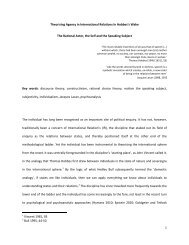biological sciences HONOURs 2014 - The University of Sydney
biological sciences HONOURs 2014 - The University of Sydney
biological sciences HONOURs 2014 - The University of Sydney
You also want an ePaper? Increase the reach of your titles
YUMPU automatically turns print PDFs into web optimized ePapers that Google loves.
28 GROUP BEHAVIOUR AND<br />
SWARM INTELLIGENCE<br />
Research Interests<br />
I am interested in a variety <strong>of</strong> questions related to group<br />
behaviour and swarm intelligence. I am particularly interested in<br />
understanding how organisms with relatively simple cognitive<br />
systems (ants, bees and slime moulds) are able to solve complex<br />
tasks. For example, slime moulds (which lack brains) can solve<br />
mazes, anticipate periodic events, make ‘clever’ decisions about<br />
which foods to consume, and even use a form <strong>of</strong> memory to<br />
navigate around their environment. Despite the fact that ant<br />
brains are tiny, colonies <strong>of</strong> ants can solve shortest path problems<br />
and respond rapidly to changes in food quality. I am also interested<br />
in the costs and benefits <strong>of</strong> group living.<br />
Honours projects<br />
Honours projects will usually focus on some aspect <strong>of</strong> behaviour in<br />
ants, slime moulds, honey bees or Australian native bees (although<br />
I am open to working with other species).<br />
1. Ants<br />
Ant colonies build complex, efficient networks between nests.<br />
We have shown that the shape <strong>of</strong> these networks is highly<br />
efficient, but we don’t know how individual ants use the network,<br />
or how networks respond to changes in traffic. Student projects<br />
in this area would study the response <strong>of</strong> networks to various<br />
Dr Tanya Latty<br />
Room 253, Macleay<br />
Building A12<br />
T: (02) 9036 5162<br />
E: tanya.latty@sydney.<br />
edu.au<br />
perturbations (severed trails, increase in traffic, etc), as well as examining how the individual behavior<br />
<strong>of</strong> ants leads to collective solutions.<br />
2. Slime moulds<br />
Projects on slime moulds can either focus on behaviour (what kinds <strong>of</strong> problems can slime moulds<br />
solve? How do these brainless organisms go about problem solving?) or on slime mould ecology. For<br />
example, we know very little about the role slime moulds play in soil ecosystems.<br />
3. Bees<br />
I am looking for students to work on a project that will examine the ecology <strong>of</strong> native bees in<br />
community gardens.
















